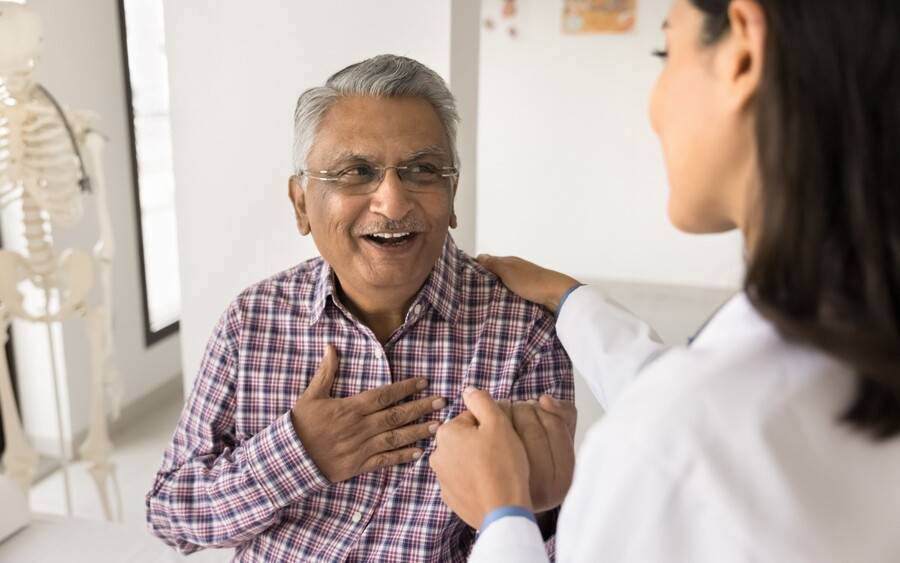Managing Chemotherapy Side Effects: Tips for Patients
Learn how to ease nausea, fatigue, hair loss and more

Learn how to ease nausea, fatigue, hair loss and more
Chemotherapy for cancer can feel like a mixed blessing. Chemo drugs target and destroy cancer cells, but they can also affect healthy cells, which can result in unpleasant side effects.
Learning ways to help manage chemotherapy side effects can make the days after treatment easier. Here are the most common side effects of chemotherapy and tips to help manage them:
1. Nausea and vomiting
Nausea is one of the most common and distressing side effects of chemotherapy. It’s also one of the most immediate, often happening shortly after treatment. Symptoms usually last for 24 to 48 hours; depending on the type and frequency of chemotherapy, some patients may feel nauseated for several days.
The following tips can help reduce nausea and vomiting after chemotherapy:
- Eat small, frequent meals throughout the day instead of three large ones.
- Avoid greasy, spicy or strong-smelling foods, which can trigger nausea.
- Stay well-hydrated with water, herbal teas or electrolyte drinks. Sip fluids slowly.
- Natural remedies, such as ginger and peppermint, help reduce nausea for many patients. Try hard candies, soft chews, tea or capsules.
“Preventing nausea is easier than treating it after it starts,” says Marin Xavier, MD, a hematologist and medical oncologist at Scripps Clinic and the medical director of Prebys Cancer Center. “We can prescribe anti-nausea medications to take before your chemotherapy treatment that can prevent or significantly reduce nausea and vomiting.”
2. Fatigue
Chemotherapy-related fatigue feels different than just being tired. It can be overwhelming and, while rest is most important, it may not be enough to relieve fatigue. Consider these suggestions:
- Try gentle activity. Short walks, simple stretches or restorative yoga can help you feel a bit more energized and improve your mood.
- Ask for help. Friends and family often want to help but don’t know how. Reach out for assistance with preparing meals, everyday tasks and running errands.
- Try to maintain a consistent sleep schedule. Take naps when you need them.
- Eat lean proteins and whole foods including fruits, vegetables and grains to fuel your body and help reduce fatigue.
3. Dry mouth or mouth sores
Some chemotherapy drugs can affect your mouth, making it feel dry or causing sores. This can make eating and drinking painful. In addition to using a prescription mouth rinse for sores, these tips also may help relieve oral side effects of chemotherapy:
- Brush your teeth gently with a soft-bristled toothbrush.
- Avoid acidic or spicy foods that can irritate your mouth.
- Keep your mouth hydrated and stimulate saliva with sugar-free candies, frozen fruit bars or ice chips.
4. Hair loss
Chemotherapy drugs cannot tell the difference between cancer cells and other types of cells, so some drugs damage hair follicles and cause hair loss. Ranging from thinning to complete hair loss, this typically occurs on the scalp but can happen anywhere on the body.
With rare exceptions, hair begins to grow back about six to eight weeks after treatment ends. Patients may be surprised to find that the texture or color of their new hair growth is different; for example, patients with straight hair may have curls.
While chemotherapy hair loss can’t be fully prevented, a technique called scalp cooling or scalp hypothermia may help.
“Scalp cooling is an option for certain types of cancers and treatment regimens and can be effective to reduce the amount of hair lost during treatment,” says Dr. Xavier. “Patients wear a cold cap before, during and after their chemo session to reduce the effect of the drugs on hair follicles. There can be side effects to this, such as headaches and scalp discomfort, so talk to your doctor about the pros and cons with your specific treatment.”
Hair loss can be one of the most upsetting side effects of chemotherapy but remember it is temporary. Wigs, hats, scarves and head wraps offer many beautiful and stylish options. Many patients choose to forego any head covering. It’s a matter of personal preference, but do protect your bare scalp from the sun, heat or cold.
5. Chemo brain
Chemo brain is a condition that causes cognitive issues, such as difficulty concentrating, problems with short-term memory, feeling confused or having trouble finding the right words when speaking. Symptoms typically diminish after chemotherapy ends but it can take some people a year or more to feel like their cognitive abilities have returned.
The following may help minimize chemo brain symptoms:
- Try mild to moderate exercise. Just five to 10 minutes of physical activity can help with brain function.
- Use memory aids, such as a day planner, timer, phone calendar or sticky notes, to help you remember tasks and appointments.
- Get plenty of rest and eat as well as you can. Fatigue and hunger can make chemo brain symptoms worse.
- Exercise your brain with word or number puzzles, trivia and other brain games.
“These symptoms are common with chemotherapy, but every patient responds differently,” says Dr. Xavier. “Discuss any symptoms or other concerns you have with your care team, even if you think they’re minor. Your team is there to help you through your treatment as best they can, so let them know what is happening and don’t hesitate to ask for help.”